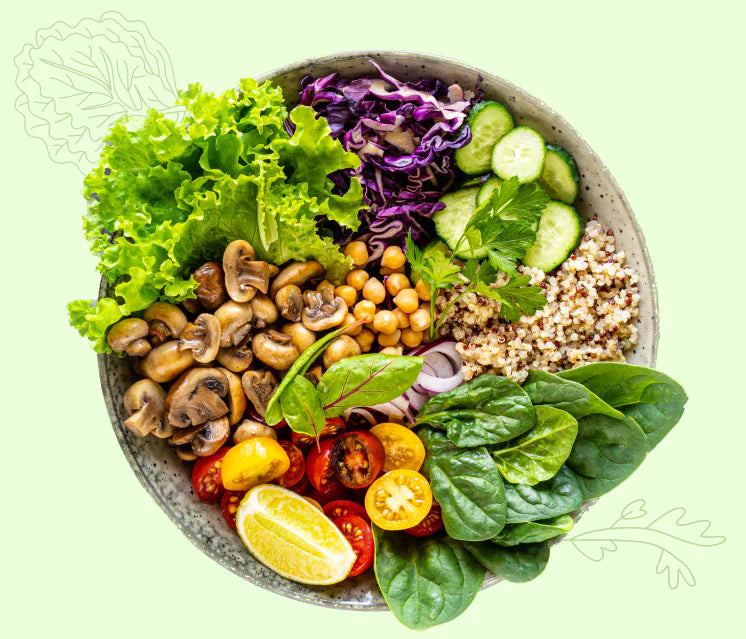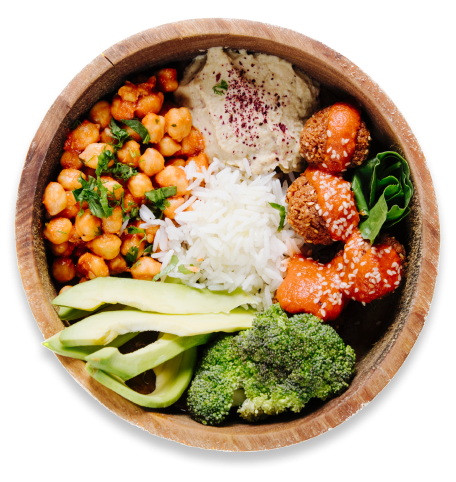Call Us 123456789
Free delivery on order over $200
Top Plant-Based Sources of Omega-3 Fatty Acids You Should Include in Your Diet
Buy meal plan
Omega-3 fatty acids are essential for good health, but many people think they can only get them from fish. If you're on a vegan diet or simply trying to reduce animal products, you might wonder where to get your omega-3s. The truth is, you can find plenty of rich, plant-based sources of omega-3 fatty acids that support your body’s needs just as well.
In this blog, we’ll explore the importance of omega 3 fatty acids, where to find them in a plant-based diet, how much you need, and tips for getting enough. We’ll also explain how healthy vegan meal plans Dubai can help you maintain a balanced intake of these vital fats.
What Are Omega-3 Fatty Acids?
Omega-3 fatty acids are a type of polyunsaturated fat. They're known as "essential" fats because your body can't make them on its own you must get them through food. Omega-3 fatty acids are important for many bodily functions, including:
- Brain health and memory
- Heart health
- Eye health
- Joint function
- Reducing inflammation
- Supporting mental well-being
There are three main types of omega-3 fatty acids:
ALA (Alpha-linolenic acid) – Found in plant sources like flaxseeds and walnuts
EPA (Eicosapentaenoic acid) – Mainly found in fatty fish and algae
DHA (Docosahexaenoic acid) – Also found in fish and algae
ALA is the form of omega-3 found in most vegan foods. Your body can convert ALA into EPA and DHA, although the process is not very efficient. This is why it's important to include a variety of omega-3 rich foods in your diet every day.
Why Omega-3 Fatty Acids Matter in a Vegan Diet
The importance of omega 3 fatty acids in a vegan diet cannot be overstated. These healthy fats help fight inflammation, protect your heart, and support healthy brain development. Research shows that low levels of omega-3 fatty acids may be linked to depression, anxiety, memory problems, and even heart disease.
Since vegans don’t eat fish, it's crucial to get omega-3 fatty acids from plant-based sources or supplements. A diet that lacks omega-3s can lead to an imbalance between omega-3 and omega-6 fats, which increases inflammation in the body. Most modern diets are already high in omega-6 from vegetable oils, so balancing that with more omega-3-rich foods is key.
Best Plant-Based Sources of Omega-3 Fatty Acids
Here are the top vegan-friendly foods rich in ALA, along with tips on how to enjoy them in your everyday meals:
1. Flaxseeds
Flaxseeds are one of the richest plant sources of ALA omega-3 fatty acids. Just one tablespoon of ground flaxseeds contains about 1.6 grams of ALA. Ground flaxseeds are easier to digest than whole seeds, so it's best to use them in that form.
How to use:
Stir into smoothies or plant-based yoghurts
Add to oatmeal or porridge
Use as an egg replacement in baking (1 tbsp ground flax + 3 tbsp water = 1 egg)
2. Chia Seeds
Chia seeds are tiny powerhouses packed with fibre, protein, and ALA. Two tablespoons provide nearly 5 grams of ALA, making them an excellent source of omega-3 fatty acids for vegans.
How to use:
Make chia pudding with almond milk and berries
Mix into smoothie bowls
Sprinkle on salads or porridge
3. Hemp Seeds
Hemp seeds have a mild, nutty flavour and are full of healthy fats, including omega-3 fatty acids. They also contain all nine essential amino acids, making them a great source of protein.
How to use:
Sprinkle over salads or avocado toast
Blend into smoothies or sauces
Stir into soups or grain bowls
4. Walnuts
Walnuts are the only nuts with a significant amount of ALA omega-3 fatty acids. Just a small handful (about 30 grams) provides over 2.5 grams of ALA.
How to use:
Eat as a snack or mix into trail mix
Add to baked goods like banana bread
Crush and use as a topping for pasta or roasted vegetables
5. Algal Oil
Since EPA and DHA are mainly found in fish, vegans can turn to algal oil a plant-based supplement made from algae. Algae are the original source of omega-3 fatty acids for fish, so algal oil gives you the benefits of EPA and DHA without any animal products.
How to use:
Take as a daily supplement (capsules or liquid)
Check with your doctor for the right dosage
6. Brussels Sprouts
These green veggies are a surprising source of ALA. Cooked Brussels sprouts offer small but meaningful amounts of omega-3 fatty acids and are also rich in fibre, vitamin C, and antioxidants.
How to use:
Roast with olive oil and garlic
Add to grain bowls or pasta
Saute with balsamic glaze
7. Seaweed and Nori
Seaweed is another plant-based source of EPA, especially varieties like wakame and nori. While amounts are small, they add up and also provide iodine, which supports thyroid function.
How to use:
Use nori sheets for homemade sushi
Sprinkle seaweed flakes over salads or rice
Add to soups or miso broth
How Much Omega-3 Do You Need?
The recommended intake of ALA for adults is about 1.1 grams per day for women and 1.6 grams per day for men. This can usually be met through a few servings of seeds and nuts daily.
For those who want to ensure they're getting enough EPA and DHA, especially for heart and brain health, consider taking an algal oil supplement. Speak to a healthcare provider for personal advice.
Sample Vegan Day of Omega-3 Rich Meals
Here’s how a full day of plant-based meals can cover your omega-3 fatty acids needs:
Breakfast: Overnight oats with chia seeds, almond milk, and berries
Lunch: Quinoa salad with roasted Brussels sprouts, hemp seeds, and avocado
Snack: A handful of walnuts and a banana
Dinner: Stir-fried tofu with flaxseed oil dressing and brown rice
Optional: Algal oil supplement after dinner
Tips to Boost Omega-3 Intake on a Vegan Diet
Grind your flaxseeds: Whole flaxseeds pass through your system undigested. Always grind them fresh or buy ground flax meal.
Use plant-based oils smartly: Flaxseed oil and hemp oil are excellent sources but not suitable for high-heat cooking. Use them in dressings or drizzle over dishes.
Balance omega-6 intake: Cut back on refined oils (like sunflower or corn oil) that are high in omega-6. Aim for a better omega-6 to omega-3 ratio.
Diversify your sources: Don’t rely on just one food. Include a mix of seeds, nuts, vegetables, and supplements.
The Role of Meal Plans and Food Delivery Services
Trying to maintain a balanced diet with all essential nutrients especially on a busy schedule can be challenging. That’s where healthy meal plans Dubai comes in. With expert-designed meals delivered to your door, you can stay on track with your nutritional goals.
At Plant Power, our best meal plans Dubai are built with ingredients rich in omega-3 fatty acids, including chia, hemp, flaxseeds, walnuts, and green vegetables. Whether you're looking to boost energy, improve focus, or simply eat better, our plant-based food delivery service makes it easier than ever.
Benefits of using a vegan meal delivery service:
Custom plans based on your health goals
Meals crafted by nutritionists and chefs
Rich in essential nutrients, including omega-3 fatty acids
Saves time on shopping, prepping, and cooking
Delicious, creative meals that never get boring
With the right support and planning, you can enjoy all the benefits of a vegan diet without missing out on key nutrients like omega-3 fatty acids.
Final Thoughts
Omega-3 fatty acids are essential for your heart, brain, joints, and overall wellbeing. While most people associate these healthy fats with fish, there are many excellent plant-based sources that fit perfectly into a vegan lifestyle.
Flaxseeds, chia seeds, hemp seeds, walnuts, and algae-based supplements are all smart choices. By incorporating these foods into your meals daily and considering a high-quality plant-based meal plan, you can meet your omega-3 fatty acids needs with ease.
Looking for an easier way to get balanced meals rich in healthy fats and nutrients? Check out our healthy meal plans Dubai at Plant Power, where you’ll find the best meal plans Dubai tailored to your needs.
What are you waiting for?
It’s time to kickstart your health journey with nourishing and delicious meals to boost your energy and overall health!
